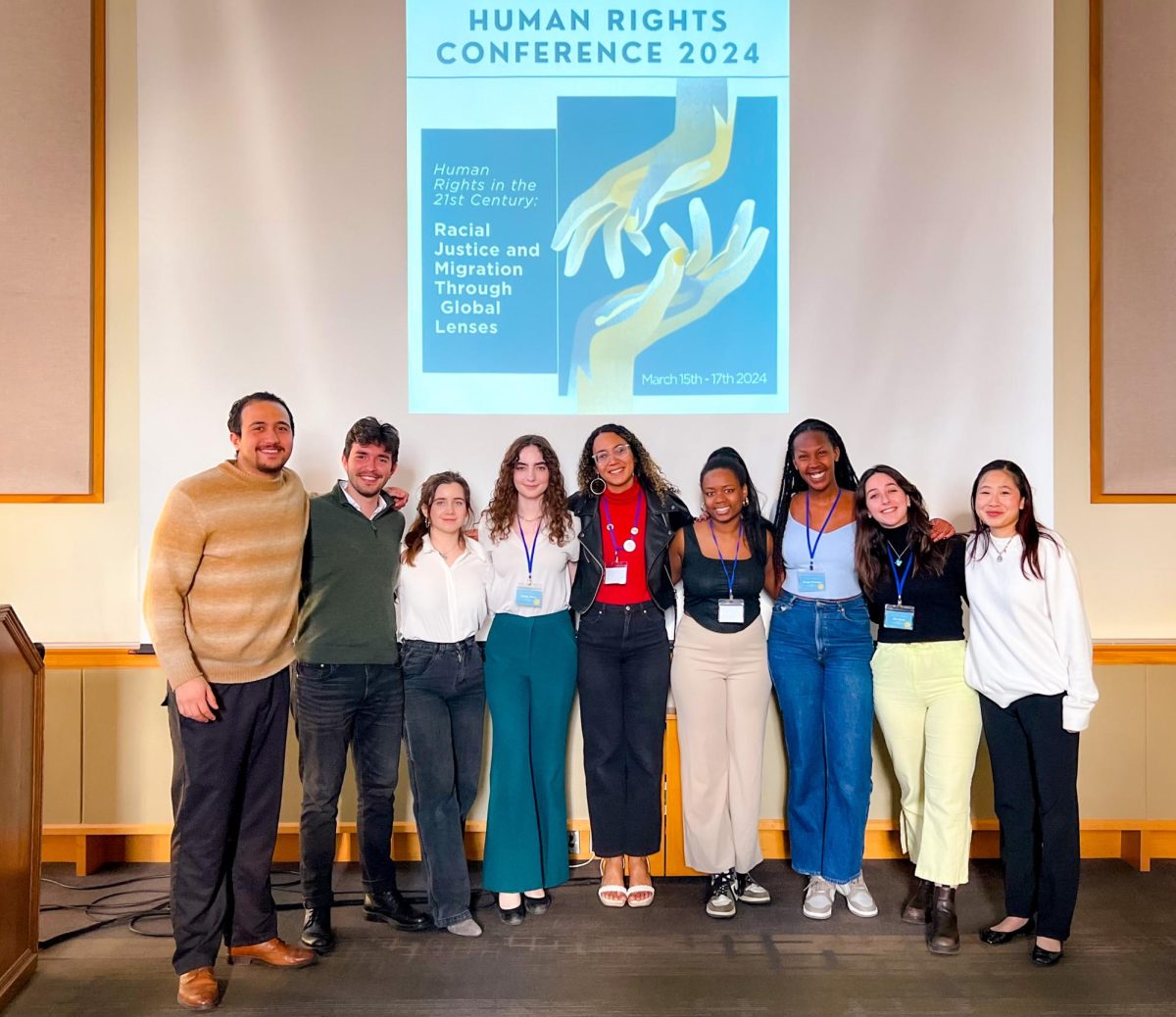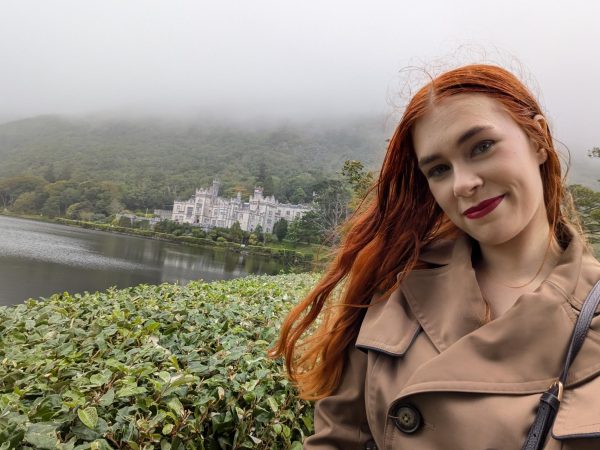In the final days of spring break, a group of Macalester students, as well as students from other universities across Minnesota, gathered as delegates for Macalester’s Inaugural Human Rights Conference with the theme “Human Rights in the 21st Century: Racial Justice and Migration through Global Lenses.” Beginning on Friday, March 15, students spent three days attending lectures, panels and workshops to learn about human rights challenges in the modern world.
The new student organization responsible for this event, Human Rights at Macalester College (MACHR), was founded after the two co-chairs, Amanda Nogueira ’25 and Chantal Pangula ’26, attended Northwestern University’s Human Rights conference last year and were inspired to bring this concept to Macalester. Professor Wendy Weber, faculty advisor to MACHR, introduced the co-chairs at the beginning of the conference.
“In the best tradition of Macalester students, [Nogueira and Pangula] returned to Mac not only inspired by their experience at Northwestern, but motivated to do something similar at Macalester,” Weber said. “They wisely decided to start small, focusing on Minnesota colleges and universities, and well, here we all are.”
Nogueira and Pangula were not alone in the planning. They were joined by a team of other students who worked to organize the speakers and panelists who presented throughout the weekend.
“There was a research group and … people were divided into the three panels and workshops: climate migration, Mediterranean migration and Latinx migration,” Nogueira said. “And with our support, each of these people are responsible for looking for speakers and panelists.”
The conference officially began in the Alexander G. Hill Ballroom of Kagin Commons with the opening keynote speaker Dr. Sumudu Atapattu, a professor and director of the Global Legal Studies Center at the University of Wisconsin Law School. Atapattu discussed the various human rights issues that the modern world is facing. She began by addressing the relationship between colonialism and international law.
“So many of these international law principles were created at a time when states were under colonial domination,” Atapattu said. “Southern countries have consistently argued the system is unfair.”
Atapattu went on to discuss a variety of topics, including human migration and displacement, environmental justice frameworks and the intersectionality of those who often face human rights violations and those who are vulnerable to other modern problems, such as climate change and environmental issues.
“The unfortunate thing is that these vulnerabilities and marginalization intersect with one another,” Atapattu said. “Racial capitalism, the current economic system that we have, caused tons of change, caused all of these problems.”
At the conclusion of Atapattu’s speech, delegates enjoyed the welcome dinner and the conference adjourned for the evening.
The next morning, delegates gathered in Davis Court for the first of three panels centered around climate migration. Panelists included Atapattu, Dr. Niiyokamigaabaw Deondre Smiles — an assistant professor of geography at the University of Victoria in British Columbia, Canada — and Tea McClenty, the executive director of Minnesota 350. The panel, which was moderated by Ainsley Meyer ’26, featured a discussion of those who are most affected by and vulnerable to climate change and the number of governments that do not take action to protect those groups.
Smiles discussed the response to the climate crisis in British Columbia, and how people only started calling for action once the general population was affected.
“Literally about three months before that, there were Indigenous villages and settlements burned off the face of the planet by wildfires that were ravaging the interior of B.C.,” Smiles said.
Following the panel, delegates joined the Sustainability Office in the Ruth Stricker Dayton Greenhouse to assist in planting seeds and preparing soil as the first workshop of the event.
The second panel of the conference, “Humanizing Our Laws: The Termination of DACA, A Perilous Human Rights Challenge Legitimized by U.S. Immigration,” was moderated by Kampe Ishimwe Rushoka ’26. Panelists included Interim Director of the Immigration History Research Center Dr. Michele Waslin, Outreach Coordinator for the Minnesota Attorney General’s Office Marco Hernandez and Pro Bono Manager at the Immigration Law Center of Minnesota Tracy Roy.
Waslin began by discussing the history of Deferred Action for Childhood Arrivals (DACA) and how the policy came to be. She also addressed the common confusion around what DACA actually is.
“A lot of people say that DACA was an executive order,” Waslin said. “It was not an executive order. DACA was actually a memo that was written from the Secretary of Homeland Security, and it provides guidance to various agencies on their exercise of prosecutorial discretion.”
Waslin explained that the memo deprioritized the undocumented people brought to the United States as children, but DACA is an incredibly vulnerable policy.
“Because President Obama could, under his administration, issue this memo and create the DACA program, it also means that new presidents could decide to end DACA and to reprioritize this group of undocumented immigrants,” Waslin said.
Roy discussed the immigration system of the United States and why the people who benefit from DACA have issues with it.
“People often talk about how our immigration system is broken,” Roy said. “It’s actually not broken — it works exactly how it was set up to work. Our country was founded on the ideals of white supremacy, and our immigration system was also founded on that.”
Hernandez then talked about the activism and work that goes into making change in policy. One example was the recent driver’s licenses for all legislation in Minnesota.
“[Over] those 20 years, the people who led that fight was a coalition of immigrant leaders and organizations,” Hernandez said.
For the second workshop, delegates participated in an international campaign organized by the human rights awareness organization Amnesty International: Write for Rights. The campaign consists of people from around the world writing letters on behalf of people who have faced human rights violations in hopes to help the situation through collective power. Each year, Amnesty International selects cases from different parts of the world to be the subject of the letters. Each delegate used the template designed by Amnesty International to write at least one letter.
The second evening of the conference concluded with a dinner and movie night in the John B. Davis Lecture Hall, with the delegates watching the Netflix original “The Swimmers.” This film, based on a true story, depicts two Syrian refugees on their journey to find safety in Europe. This movie served as an introduction to the topics covered in the third panel, which took place the next day.
Before the final panel, Smiles presented a workshop on research methods and how to do research around marginalized communities, particularly within Indigenous communities. He stressed the importance of establishing trust and communication when working with groups of people that have historically not been respected by researchers.
“Consent is an ongoing process,” Smiles said. “It can be revoked at any time, and it’s always a good idea to check it, right? In research, it functions the same way.”
Smiles then utilized an analogy for research methods: cooking. He explained that a lot of the key steps are similar between the two activities.
“What has multiple steps that people often follow?” Smiles asked. “A recipe. And so I thought, ‘that’s actually a perfect analogy for an Indigenous research methodology.’”
The final panel of the event was focused on Mediterranean migration. Co-moderated by Marouane El Bahraoui ’25 and Ella O’Driscoll Silcox ’27, this panel was slightly different than the two previous ones. Dr. Melissa Phillips, a senior lecturer in humanitarian and development studies at Western Sydney University, appeared on a pre-recorded video from Australia. Phillips discussed the labels that are applied to people who are trying to seek a better situation.
“It’s really easy to get caught up in defining migrant, refugee, asylum seeker [and Internally Displaced Persons (IDPs)],” Phillips said. “There’s a sea of acronyms and labels in this area. There’s a violence in labeling that also homogenizes experiences. All migrant experiences are not the same, all refugee experiences are not the same.”
Afterwards, Robin Jenkins, founder and CEO of Atlantic Pacific, appeared via Zoom to talk about his experience assisting migrants on their way to Europe. Atlantic Pacific is an organization that works to prevent global drowning through the deployment of lifeboats to underserved areas. Jenkins had the opportunity to assist migrants arriving on the Greek island of Lesbos during the peak of the Syrian refugee crisis in 2015. Originally, he was only going to drop off a boat and train the lifeguards how to use it, but he ended up staying to help.
“Every time we would start a session, to start training them, somebody would say ‘there’s another, there’s another boat.’” Jenkins said.
Jenkins was able to help save so many people in a short period of time, with the use of his small lifeboat.
“So this three and a half meter boat, not very significant, was involved in the rescue of over 2,500 people in a period of five weeks,” Jenkins said.
With all of the skills and information that delegates acquired over the course of the weekend, there was one key question that needed to be answered: what jobs are available in this field? The group assembled in the Ruth Stricker Dayton Campus Center to hear from five different people who have all made careers working in human rights. Delegates learned about the Master’s in Human Rights program at the University of Minnesota, different ways to get involved in human rights advocacy groups and the process of lobbying for human rights legislation on the local, national and international levels.
Rounding out the conference, Professor Ibrahim Awad of The American University in Cairo, Egypt gave the closing keynote speech via Zoom.
Overall, the weekend consisted of plenty of learning opportunities and a lot of information. Both co-chairs expressed their hope that the conference inspired the delegates to continue to think about human rights issues of the modern world. Pangula mentioned that, while the conference was only three days, the information provided could provide the foundation for future projects.
“The main idea of this is really invoking some critical thoughts,” Pangula said. “Anything that evokes any sort of curiosity can really be the spark of something bigger.”
Nogueira mentioned that she hopes this conference will inspire future events, just as the conference at Northwestern inspired the creation of this one.
“[Helping the delegates] to feel more engaged and willing to take action themselves, seeing that it is possible [is important so that] more events like this can happen,” Nogueira said.
In the concluding speech before adjourning the conference, Nogueira and Pangula thanked the delegates for participating, and for giving them a closing call to action.
“We hope that you [have heard] some new things and try to learn more about them, grasp understanding and bring them back to your communities: back home, to your universities or wherever you attend regularly,” Pangula said. “Just carry this mindset through of learning together, joining with each other and respecting human life.”











